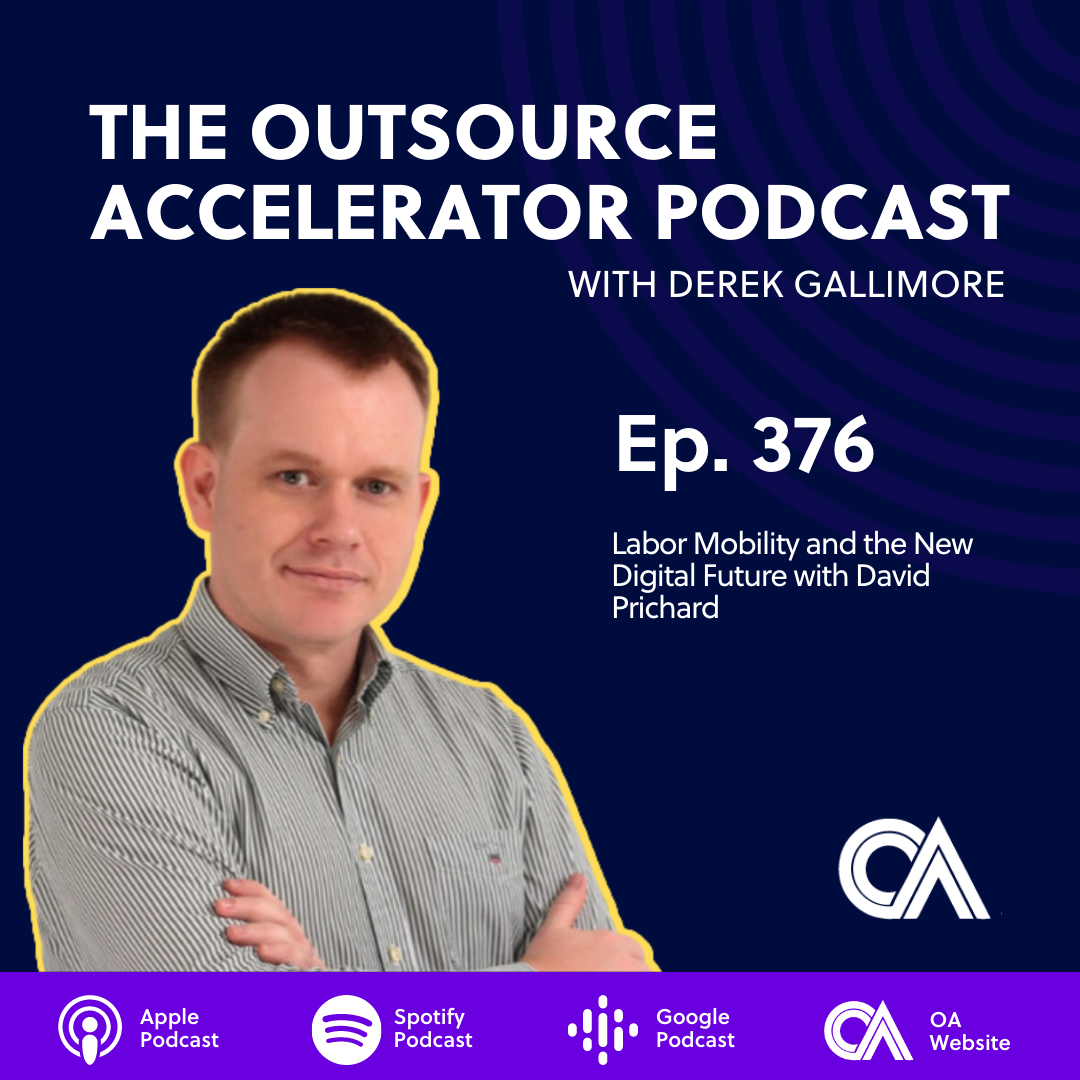Labor Mobility and the New Digital Future with David Prichard

The Outsource Accelerator Podcast features David Prichard of The Nile, an Australian e-commerce store, and the Objectivist Club of the Philippines. He was last featured in episode 360 of the podcast.
David Prichard
Derek Gallimore talks with David Prichard of The Nile Group and the Objectivist Club of the Philippines. David is a regular guest of the podcast and was last featured in episode 360.
Outsourcing shaped the way employers and workers connect and run operations. In this episode, Derek and David delve further into labor mobility and the future of work in the increasingly digital world.
About David Prichard
For new listeners in the podcast, David Prichard is the country manager for The Nile, a leading Australian e-commerce store selling books, baby toys, and accessories.
By their standards, the company has “a fairly large operational presence” in the Philippines. They have around 50 employees doing back-office functions for the store, all of them reporting directly to David.
David is also interested in philosophy applicable to everyday life and how to “achieve more” in a way “consistent with man’s nature and needs.” At the same time, he runs a philosophy group in the Philippines dedicated to Ayn Rand’s Objectivism.

Glaring examples of labor mobility
David says that labor mobility “has not always happened” until outsourcing came along. He imagined that people in the earlier days can move easier to locations with more opportunities such as the United States.
However, David realized that going around the world nowadays “is not always the most desirable thing.” This is since people will start to build and connect with their current communities once they settle in them.
David looks forward to a future with “more freedom for people and labor” to look for global opportunities. According to him, highly-skilled talents are affected by the “lottery” of having been born in developing countries while the developed ones have “restrictive border policies” for migration.
For David, entrepreneurs “find opportunities [in] connecting different parties” that can “achieve wonderful things.” Outsourcing, on the other hand, has contributed a lot towards “closing [talent] gaps and matching the skills” needed by the employers.
Thanks to the technology of outsourcing, employees can easily get a local job close to their homes or work with a foreign company without barriers and hassles.
Are developing countries “taking away jobs” from the West?
Per David, trade and employment work the same way in terms of interacting and creating value out of their needs. Employers need skilled labor while employees seek income and fulfillment in life. Yet, barriers and restrictions “prevent [them] from meeting together.”
For David, “behind the high salaries in the [developed] countries [are] lost opportunities” for further growth, based on economist Frederic Bastiat’s “seen and unseen” principle.
David also thinks taking jobs from developed countries is a “profoundly erroneous view.” He thinks that prosperity out of setting limits and policies for workers outside an area is “a recipe for stagnation,” making businesses lose their competition.
How will the government control outsourcing
David predicts that the government would try to control outsourcing and global employment even though it’s a “game they can’t win.”
Businesses currently need to comply with the imposed rules and pay taxes and benefits when setting up their operations. With this, strict employment policies force companies to hire in-house.
Outsourcing, as David puts it, “blows [these policies] away.”
Given the control governments have over countries, David says they will still find a way to collect taxes on outsourced workers. However, he is positive that this won’t be easy for them since entrepreneurs and developers “are always five steps ahead.”

The workforce in the future
David thinks that a global workforce is “most likely” to happen in the future. While companies will retain a “global headquarters” somewhere, employees can apply to them anywhere in the world.
At the same time, employer-employee relations will change with the involvement of technology.
However, a possible downside from this move would be that the younger generation “will know nothing else.” This is why for David, retaining certain aspects from the “old ways” of work is necessary.
While most roles will be affected by the “massive changes” brought by technology, many workers will still choose “traditional professions.” Per David, these traditional workers should learn how to “accentuate the benefits [they] can give” that is absent in a digitized work.
Bookstores are good examples for this. Most traditional bookstores that stood still nowadays offer a more interactive approach to buying books such as offering coffee and organizing book reading sessions.
At the same time, David predicts that outsourcing providers “might have the same fate as travel agents” in a few decades. Those providers who will stay within this time will be “offering something special” to their clients.
However, this is still a forethought for most providers for now.
Interested clients can reach out to David through his LinkedIn account. Also, check out the page of the Objectivist Club of the Philippines to learn more about Ayn Rand and Objectivism.







 Independent
Independent




